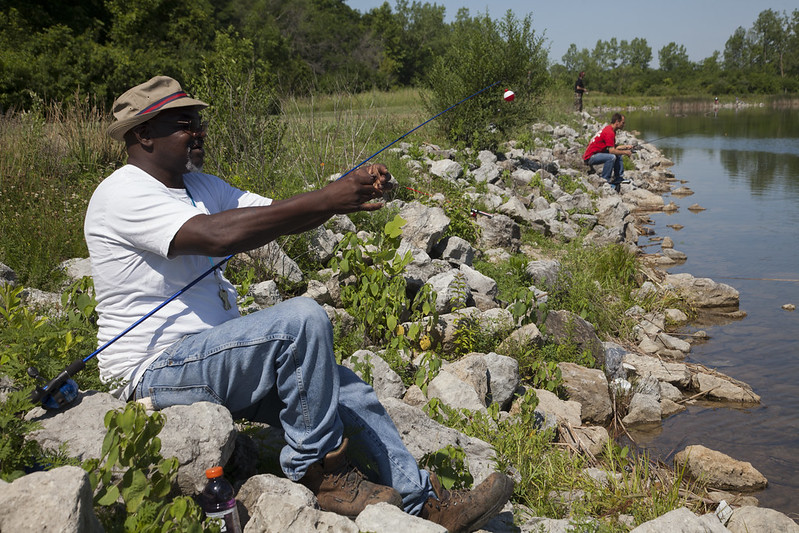Published May 26, 2022
Nature Play in your MetroParks
Heads up! This article was published 2 years ago.
Discover why research shows children who spend time outdoors are healthier, happier and smarter.

Jai’Yanna Bass, 11, and sister Sai’Ari Cobb, 9, love playing outdoors, jumping on their trampoline, growing pumpkins, and enjoyinggames with their other sisters, cousins and friends. They also love visiting parks, climbing on the playground at Island MetroPark, as well as climbing giant logs, searching for critters under piles of leaves and poking sticks in the mud at the nature play area at Englewood MetroPark.
Unlike traditional playgrounds, nature play areas feature branches, boulders and other natural objects, also known as loose parts, that serve as outdoor playscapes and toys. These areas entice kids to explore the outdoors in a more unstructured yet safe way — and make it fun and easy for kids to experience the numerous benefits time in nature offers.
Indeed, these benefits are so numerous and important, your Five Rivers MetroParks recently enhanced two of its nature play areas, with a new one in the early planning stages and funding being sought for even more.
This spring, the nature play area at Possum Creek MetroPark re-opened after a significant expansion. It now includes a prairie play area, dry creek bed with a water source, large sand pits, balance log crossing, climbing boulders and more. The nature play area at Hills & Dales MetroPark received an upgrade last fall to include many of these same features, thanks to a grant from the Mark
A. Kreusch Memorial Fund of The Dayton Foundation. In addition, planning and fundraising are underway to build a nature play area at Cox Arboretum MetroPark, which would join such kid-friendly features as the Bell Children’s Maze and Tree Tower.
Nature play areas such as these and others in your MetroParks provide benefits traditional playgrounds do not because they allow for unstructured time outdoors. For example, manipulating branches to build a fort with other kids enhances social skills and creativity. Balancing on logs fine-tunes gross motor skills while helping children learn to take calculated risks.
Yet regardless of the playscape, one thing is critical: Children need to spend more time outdoors. Nature play areas are a free, convenient way for families and caregivers to provide that.
According to the Kaiser Family Foundation, kids ages 8 to 18 spend nearly eight hours each day using screens, including time playing video games and watching TV and mobile devices. Meanwhile, most kids spend approximately 10 minutes outdoors each day. However, according to the Children & Nature Network, regular time in nature is essential for children’s healthy development. And a growing body of research shows spending more time in nature improves some of today’s most pressing problems related to children, including obesity, ADHD, low self-esteem, poor mental health and low academic performance. MetroParks’ nature play areas offer all this and more — all while enhancing children’s physical, social and emotional well-being, as well as fostering their love of nature and desire to protect it.
Spending Time Outdoors Improves:
- social, problem-solving, communication and collaborative skills
- concentration, cognitive functioning and creativity
- academic performance and enthusiasm for learning
- fine and gross motor skills, coordination, vision, and balance
- self-esteem, impulse control and stress
Five Rivers MetroParks Outdoor Play
Nature Play Areas
- Englewood MetroPark
- Hills & Dales MetroPark
- Possum Creek MetroPark
- Sugarcreek MetroPark
- Wesleyan MetroPark
- Wegerzyn Gardens MetroPark (Children’s Discovery Garden)
Traditional Playgrounds
- Hills & Dales MetroPark
- Island MetroPark
- Wesleyan MetroPark
Water Play Areas
- Island MetroPark
- RiverScape MetroPark





